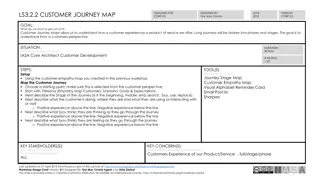Factors Influencing Customer Choice: Psychological, Sociocultural, Economic, and Government Factors
Psychological factors, such as perception and lifestyle, play a key role in customer choice. Sociocultural influences from society and culture also impact decisions, while economic factors like income levels and government policies can sway customer preferences. Understanding these factors is crucial for businesses to tailor their products and marketing strategies effectively.
Download Presentation

Please find below an Image/Link to download the presentation.
The content on the website is provided AS IS for your information and personal use only. It may not be sold, licensed, or shared on other websites without obtaining consent from the author. Download presentation by click this link. If you encounter any issues during the download, it is possible that the publisher has removed the file from their server.
E N D
Presentation Transcript
PSYCHOLOGICAL FACTORS INFLUENCING PSYCHOLOGICAL FACTORS INFLUENCING CUSTOMER CHOICE CUSTOMER CHOICE Psychological factors influencing customer choice are very significant. Psychological factors refer to the way we think, feel and reason when we decide to select a particular product and include things like the way we perceive the product, our personality, lifestyle and attitudes and beliefs. It can be really helpful to understand what the customer is feeling and reasoning, because product features can be added that help the customer gain a more favourable feeling to the product.
Why, for example do you tend to buy brands? A brand is a design, logo, name (often a combination) that distinguishes a business s products from competing products. The reason is mostly that that brand provides you with the psychological benefits of confidence, esteem and total satisfaction in the brand.
SOCIOCULTURAL FACTORS INFLUENCING SOCIOCULTURAL FACTORS INFLUENCING CUSTOMER CHOICE CUSTOMER CHOICE Sociocultural factors can also be important when customers choose some products. Sociocultural factors are those influences from the society and culture the customer is a part of. These influences refer to things like social class, family, household type, roles and status. You need only think of products such as haircuts, or hair styling and clothing to realise the influence your family, peers and school have on your choices.
For these reasons, changes in society and social structures need to be carefully monitored. The trend towards the healthy lifestyle is one of the most significant sociocultural influences. Increasingly, there is a strong social reaction to the aggressive advertising of products with too much fat to children, and there are opportunities to develop products that cater to these changes.
ECONOMIC FACTORS INFLUENCING ECONOMIC FACTORS INFLUENCING CUSTOMER CHOICE CUSTOMER CHOICE The global financial crisis in 2009 demonstrated the importance of economic factors in influencing customer choice. Economic factors refer to changes in spending and income in the wider economy. When an economy is growing and confidence is high, customers are more inclined to make large purchases such as cars, furniture and whitegoods. However, if there is a loss of confidence, as there was following the global financial crisis in 2009, customers react by increasing their savings. Several years later in 2011 major retail stores such as david jones were relying on sales to persuade customers to purchase products.
GOVERNMENT FACTORS INFLUENCING GOVERNMENT FACTORS INFLUENCING CUSTOMER CHOICE CUSTOMER CHOICE Government factors influence customer choice in a number of areas. Government factors refer to the capacity of a government to tax, make grants and implement laws and regulations that impact on the type of product a business markets and the price. The regulations on tobacco packaging are an obvious example. The federal government required cigarettes to be sold in plain packages. The purpose was to make the product less attractive to young people and in this way reduce the overall level of smoking.
CONSUMER LAWS CONSUMER LAWS The purpose of consumer laws is to protect consumers from business exploitation. State governments have a range of laws designed to protect consumers. However, laws designed to control business behaviour are a commonwealth responsibility. The rules for fair and reasonable behaviour by business are set out in the trade practices act 1974 (cth). The Australian competition and consumer commission (ACCC) enforces the rules. Some of the most important consumer laws relate to deceptive and misleading advertising, price discrimination, implied conditions and warranties.
DECEPTIVE AND MISLEADING ADVERTISING DECEPTIVE AND MISLEADING ADVERTISING Businesses are prevented, under the trade practices act, from using deceptive and misleading advertising. Examples of deceptive and misleading advertising include misleading information on the features of a product and using bait advertising (promoting a heavily discounted product where there are very few of the products for sale). Advertising has to be truthful. Based on your experiences, do you think advertising is truthful?
PRICE DISCRIMINATION PRICE DISCRIMINATION Price discrimination is where a good is sold at different prices to different customers. The aim of the legislation is to stop the discrimination against small retailers, who are mostly forced to pay higher prices for products where larger businesses get the same product at a lower price. The trade practices act tries to stop this practice but is relatively ineffective because the legislation provides for so many exceptions.
IMPLIED CONDITIONS IMPLIED CONDITIONS Both state and territory fair trading acts and the trade practices act 1974 provide consumers with basic protection in relation to the goods and services they buy. In essence, these laws require that any goods sold will comply with the way they were described to the customer, will be of merchantable quality and fit for the purpose they were intended to achieve. If, for example, you purchase a packet of chips filled with air and no chips, you are entitled to have the packet replaced.
WARRANTIES WARRANTIES Product warranties play an important role in marketing by providing customers with an assurance that the product will perform satisfactorily over the warranty period. A warranty is a guarantee that the product will perform satisfactorily and that any defects will be corrected if these occur during the warranty period.
Warranties are a very important part of the marketing of new products and new brands. For example, when Korean cars were first marketed in Australia, there was a reluctance to buy them because they had no track record in Australia. The extensive warranties offered at the time overcame this reluctance. Currently, the marketing of extended warranties on electrical and whitegoods is both common and profitable. The extended warranty occurs when, for a price, you can extend a standard warranty of, for example, a year to three years.
Ethical Truth, accuracy and good taste in advertising it is expected that when marketers distribute information through advertsing that it is truthful, accurate and in good taste Products that may damage health restrictions placed by the government on the sale of such items as tobacco and alcohol. Also restirctions on advertsing and sponsorship. Engaging in fair competition unfair competition includes; price fixing (by 2 or more competitors to reduce competition), misleading advertising regarding the products of a competitor) Sugging - is the pretence of market research where the real purpose is to sell products to a consumer who has expressed no desire to purchase them. The purpose of the practice is to deceive the customer. It is illegal in Australia but very difficult to detect.

















































